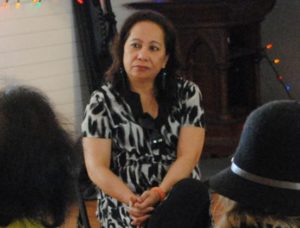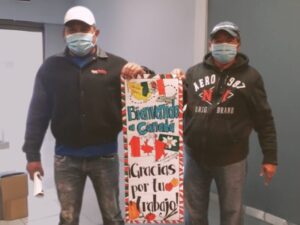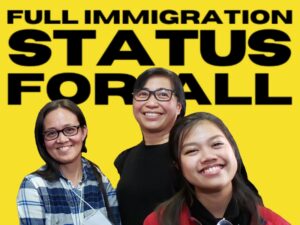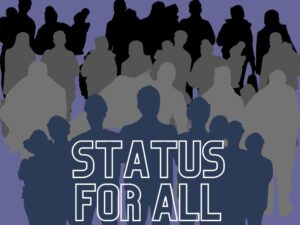KAIROS’ migrant justice workshop at the 2019 Cahoots Festival

An excerpt from “Justice and solidarity at the Cahoots Festival: Annual gathering equips Christians to live out Social Gospel” published in the Anglican Journal.
The second full day of Cahoots began once more with morning worship. A period of prayerful contemplation encouraged participants to look back on the previous year and consider when they had most felt God’s presence. Such exercises nurtured a sense of spiritual healing throughout the festival.
The agenda on this sunny morning included a session on justice for migrant workers facilitated by Connie Sorio, migrant justice coordinator for KAIROS Canada. Sorio explained the history of live-in caregivers in Canada going back to the early 1900s. During the first part of the century, many European women immigrated to Canada to work as caregivers and were able to become permanent residents with full rights.
Conversely, it was only in the 1950s and ’60s, when women from regions such as Latin America and Asia began to immigrate to Canada in larger numbers, that government policy changed to giving these women temporary work permits. Sorio described this policy change as an example of systemic racism. Protests to give such immigrants permanent residency status began during this period and continue to this day.
Two women who had come to Canada from the Philippines to work as live-in caregivers spoke during the workshop. Each had been induced to immigrate to Canada based on false promises.
One had worked in business in the Philippines but gave it up to come to Canada, only to find herself working as a mushroom picker on a farm for long hours and low wages. The other had worked at a hospital in the Philippines and moved to Canada to work as a caregiver, yet was paid an allowance far less than the wages she had been promised. Both described struggling to support their families and to stay in Canada amidst a labyrinth of bureaucratic red tape.
Sorio describes such cases as human trafficking, and points to the need to expand definitions of trafficking beyond that for sex purposes to include migrant workers. Both women on the panel, she says, “were brought here painting a very rosy picture of what their lives would look like coming to Canada. They were brought here on the premise that they would be getting high wages, housing, and so forth, protection of their rights, and the opportunity to become permanent residents, only to find out that when they finally arrive, those are just promises.
“The hourly wage that they were promised was not honoured. They were cramped in a room with six other people, with one bathroom. They worked from dawn to dusk, not being paid overtime or anything. They don’t have access to health and safety, and they’re expected to work and they cannot leave the employer because their status is tied to their employer.”
In February 2019, the Government of Canada announced that it would replace its Caregiver Pilot Program with two five-year pilot programs that would provide a pathway to permanent residence status after working in Canada for two years. KAIROS Canada called the change “an important step in the right direction,” but continues to advocate for the rights of all migrant workers to become permanent residents.
This article was written by Matt Gardner and published in the Anglican Journal on June 13.












